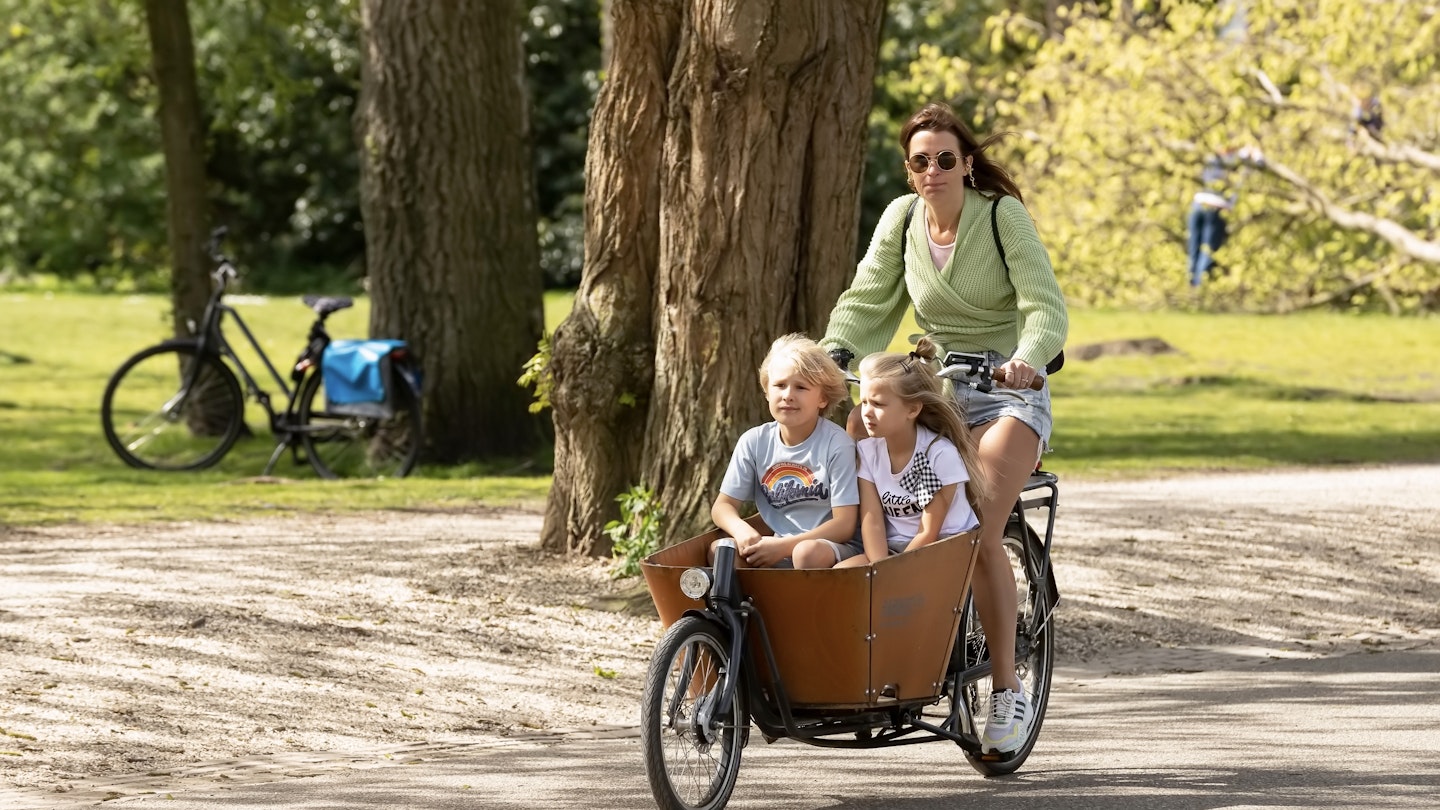Getting Around Amsterdam with iBestTravel
Sensible shoes and a good sense of direction will get you far in Amsterdam, one of the world’s easiest places to navigate.
The Dutch capital is compact and thus extremely walkable – perhaps too walkable, as its main streets tend to get very crowded with visitors. Luckily, public transport connecting central Amsterdam to more spacious outer districts is extensive, reliable, and budget-friendly.
Free ferry rides allow you to experience being an Amsterdam commuter, whisking you away to the trendy emerging Noord neighborhood.
Of course, no visit to the Netherlands is complete without a fiets (bicycle) ride. Bicycles are more common than cars here and serve as an essential, sustainable means of transport.
Getting into the City from Schiphol Airport
From Amsterdam’s global hub, you can easily reach the city center by train, bus, or taxi (assuming you won’t have your own vehicle). Frequent trains are highly recommended, running to multiple stations, including Amsterdam’s Centraal Station 24 hours a day.
This is the most economical option for getting into the city; however, the fare is not included on the I Amsterdam card, which does require a separate ticket purchase. You can conveniently buy a ticket at the airport, alongside bus tickets and the OV-chip card for public transport in town, which you can top off as needed.
City and regional bus stops can be found outside Schiphol Plaza to take you into the city. The Amsterdam Airport Express bus costs a few euros more but is the fastest route to areas near Museumplein and Leidseplein. You can catch it just outside the arrivals hall, along with a shuttle van that goes to hotels – a more expensive yet convenient option.
After midnight, when trains from Schiphol Airport to Centraal run hourly rather than every 10–15 minutes, a taxi may be your best bet. It generally takes 30 to 45 minutes to reach the city center and costs from €35 to €55, although you might save a bit with a ride-hailing service.
Maximizing Your Travel Budget
GVB is Amsterdam’s public transport authority. Downloading its app will be immensely helpful during your travels.
Purchasing single-use, one-hour tickets can be cumbersome, so we recommend buying a disposable OV chipkaart from stations and supermarkets.
We also encourage travelers to consider GVB’s multiday ticket options, which span durations from one to seven days. These tickets make exploring the city more convenient and economical.
Moreover, remember to validate your card on each ride. Your card will be valid from the start of your first journey.
Familiarize Yourself with the Tram System
The primary mode of public transport in the city is the tram. After a long day of exploring, you’ll likely become well-acquainted with the tram map. If you don’t possess a multiday GVB card, you can conveniently purchase a single ticket on board.
Tip for tram tickets: Ticket purchases on trams are cashless; ensure you have a credit or debit card ready.
Explore Central Amsterdam on Foot
Walking around the city center offers the perfect opportunity to discover cobblestone lanes, hidden shops, and charming restaurants that might be overlooked otherwise.
Navigating around the grachtengordel (canal ring) is straightforward when you remember that the major canals run in a loop, in alphabetical order, with the exception of the Singel Canal.
Familiarizing yourself with the main downtown squares, like Dam, Leidseplein, and Rembrandtplein, will help keep you oriented.
Take Advantage of Amsterdam’s Cycling Lanes
Cycling is the most favored mode of transportation in the Netherlands – and Amsterdam is no exception. Riding your bicycle offers a relaxing and sustainable way to access parks and open spaces in lesser-known neighborhoods, thereby providing a unique perspective on the city.
Bike rental shops are plentiful; typically, a day’s rental costs about €10. Opting for a rental company without branding allows you to blend in more seamlessly with the locals.
Tip for cycling: As bike theft can be an issue in Amsterdam, consider getting theft insurance or utilizing bike-renting apps with pay-per-minute plans for shorter distances.
Escape the Crowds with a Ferry Ride
Free ferries depart from behind Centraal Station and cross the IJ River, providing an excellent means to evade the crowds while exploring up-and-coming areas like Amsterdam Noord. During busy hours, you’ll share the boat with numerous locals, bicycles, and mopeds.
Driving in Amsterdam: What You Should Know
Driving in central Amsterdam is generally not advisable due to narrow streets, abundant bicycle lanes, and minimal parking, which is also quite expensive. Most accommodations in the city do not provide parking facilities.
Using Taxis During Off-Hours
Given Amsterdam’s intricate maze of streets and canals, taxis can be slow and often more costly than other forms of transport. Locals typically opt for ride-hailing services like Uber or Lyft instead.
However, taxis can be advantageous late at night when regular public transport halts between midnight and 6 AM. Buses take over during those hours to service central areas and suburbs, though they can be slow.
Accessible Travel in Amsterdam
Travelers with reduced mobility will find Amsterdam moderately equipped to accommodate their needs. However, many budget and midrange hotels, particularly in older buildings, offer limited accessibility due to steep and narrow staircases.
Most museums and attractions provide elevators or ramps and accessible toilets, but it’s advisable to inquire about the entrance specifics beforehand.
Canal cruises, buses, and metro stations are generally wheelchair accessible, but some trams may not be as easy to navigate. Check official websites for comprehensive lists of accessible stops.




